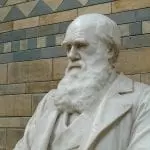[Originally published as Scientific American Is Diametrically Opposed to Its Founder’s Vision]

The man on the left is Rufus Porter. You’ve probably never heard of him, but during the middle of the 19th century, he was well known in certain circles.
He was a professional painter, specializing in painting directly on the walls of homes to decorate them. Throughout his career, he painted murals in more than 160 homes. He was also a prolific inventor, designing things like passenger blimps, windmills, and rotary engines. He even designed a “revolving rifle,” which was purchased by Samuel Colt but never put into production.
Finally, he was a promotor of science, which culminated in him founding Scientific American, the oldest continuously published monthly magazine in the United States. It contains the works of many important scientists, including Albert Einstein.
While most people who are trying to keep up with the latest scientific advances probably know about Porter’s magazine, they probably don’t know about his vision for science. That’s because Scientific American has abandoned it, despite the fact that it is clearly stated in the very first issue. Here is how Porter put it:
First, then, let us, as rational creatures, be ever ready to acknowledge God as our Creator and daily Preserver; and that we are each of us individually dependant on his special care and good will towards us, in supporting the wonderful action of nature which constitutes our existence; and in preserving us from the casualties, to which our complicated and delicate structure is liable. Let us also, knowing our entire dependence on Divine Benevolence, as rational creatures, do ourselves the honor to express personally and frequently, our thanks to him for his goodness; and to present our petitions to Him for the favours which we constantly require. This course is rational, even without the aid of revelation: but being specially invited to this course, by the divine word, and assured of the readiness of our Creator to answer our prayers and recognize our thanks, it is truly surprising that any rational being, who has ever read the inspired writings should willingly forego this privilege, or should be ashamed to be seen engaged in this rational employment, or to have it known that he practices it. (R. Porter, “Rational Religion,” Scientific American 1: 1845)
Notice what the founder of Scientific American says at the end. He says it is “surprising” that any rational being who has read the Bible would avoid giving the Creator his due or be ashamed about doing so. Nevertheless, that’s exactly what Scientific American is doing today. It gleefully promotes an atheistic worldview and even refuses to hire those who have the same vision as its founder.
While it’s sad to see what used to be an incredible magazine reject the vision of its founder, the fact is that science as a whole has been trying to do the same thing. The modern scientific method is a direct result of the Christian church, and most of the truly influential scientists of the past engaged in science because of their Christianity (see here, here, and here, for example). Nevertheless, the High Priests of the scientific community are diametrically opposed to the very faith that gave us modern science.
Thank God there are a few holdouts who honor the vision of those who founded modern science. I pray that they can do something to turn this truly unfortunate situation around.






